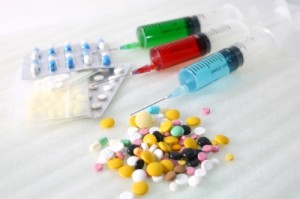What Drugs are Used for Treatment Of Hypertension?
If you have hypertension (systolic blood pressure of 140 mmHg or more and diastolic blood pressure of 90 mmHg or more) it should be adequately treated with approved drugs/medications and by dietary modifications and lifestyle changes. If yo have pre-hypertension (systolic blood pressure of 121-139 mmHg and diastolic blood pressure of 81-89 mmHg) it is time you adopt healthy lifestyle and healthy eating habits to prevent pre-hypertension from becoming a hypertension.
Generally goal of treatment of hypertension is to bring blood pressure to 120/80 mmHg if you have no complication and you are healthy. The goal of treatment of hypertension may be different for different individuals, e.g. if you are an elderly person the target blood pressure may be much higher than 120/80 mmHg (i.e. 140/90 mmHg).
For all patients of hypertension, lifestyle changes and dietary changes are essential for optimal management. Without lifestyle and dietary changes towards healthier side, the management of hypertension may be incomplete.
Medications form the mainstay of management of hypertension, because with lifestyle changes and dietary changes it may not be possible to bring blood pressure to the target level.
Commonly used anti-hypertensive drugs:
1. Thiazide diuretics:
Diuretics (commonly known as water pills) are commonly used for treatment of hypertension. Hydrochlorothiazide is most commonly used for this purpose. It is one of the first line medications for treatment of hypertension. These drugs reduce water and sodium content and improves elasticity of blood vessels.
2. Beta-blockers:
These drugs reduce workload of heart by reducing heart rate and force of contraction of heart. They also reduce sympathetic activity thereby reduce workload of heart. Examples of beta-blockers are atenolol, metoprolol, bisoprolol etc. If used alone they may not work well in blacks and should be combined with diuretics (Hydrochlorothiazide).
3. Calcium channel blockers:
These drugs helps in relaxing the muscles of blood vessels (arteries mainly) and thereby reduce blood pressure. Some of these drugs reduce heart rate also. Examples of calcium channel blockers are amlodipine, nifedipine, verapamil, diltiazem etc.
4. ACE (Angiotensin-converting enzyme) inhibitors:
These drugs relax blood vessels by inhibiting natural chemical that constricts blood vessels, i.e. angiotensin-II. Examples of ACE inhibitors are enalapril, lisinopril, parindopril, ramipril, captopril etc.
5. Angiotensin receptor blockers:
These drugs act by blocking the action of angiotensin-II (constriction of blood vessels) at receptor level. Examples of Angiotensin receptor blockers are losartan, telmisartan etc.
There are also other anti-hypertensive drugs which are used for treatment of hypertension in special situations such as pregnancy, hypertensive emergencies (severe rise in blood pressure, e.g. systolic pressure of over 200 mmHg and need immediate medical intervention to reduce blood pressure) etc.
Centrally acting agents:
These agents prevent signals from brain that cause heart rate to increase and blood vessels to contract, e.g. methyledopa, which is commonly used to treat hypertension during pregnancy.
Vasodilators:
These drugs cause dilatation of blood vessels thereby reduce blood pressure. These agents are used for treating hypertensive emergencies. Example is sodium nitropruside.
Alpha-blockers:
These agents cause dilatation of blood vessels by reducing nerve impulse to blood vessels. Examples of alpha-blockers is prazosin, terazosin etc.
Image courtesy of scottchan / FreeDigitalPhotos.net
Related posts:



 Regular visits to the chiropractor help promote and maintain spinal health, including the nerves and bones. Chiropractors adjust and realign joints that are out of place due to accidents or uncomfortable lifestyles. One uncomfortable lifestyle that can benefit from chiropractic care is pregnancy.
Regular visits to the chiropractor help promote and maintain spinal health, including the nerves and bones. Chiropractors adjust and realign joints that are out of place due to accidents or uncomfortable lifestyles. One uncomfortable lifestyle that can benefit from chiropractic care is pregnancy.


 Diabetes is such as disease, where what foods you eat and what foods you avoid can make a lot of difference in the outcome (control of blood sugar) of the disease. The main aim of management of diabetes is to control blood sugar level within normal limit and prevent complications from developing (which can be done only by keeping blood sugar under control). As eating right food and wrong food can make a lot of difference, it is more important to know what foods to avoid in diabetes than what foods to eat in diabetes.
Diabetes is such as disease, where what foods you eat and what foods you avoid can make a lot of difference in the outcome (control of blood sugar) of the disease. The main aim of management of diabetes is to control blood sugar level within normal limit and prevent complications from developing (which can be done only by keeping blood sugar under control). As eating right food and wrong food can make a lot of difference, it is more important to know what foods to avoid in diabetes than what foods to eat in diabetes. Dr. Lucille K. Georg/CDC
Dr. Lucille K. Georg/CDC  Eric Kayne for NPR
Eric Kayne for NPR  Courtesy of the Humane Society of the United States
Courtesy of the Humane Society of the United States  Maintaining fresh breath is an important part of overall good hygiene. Sometimes a person can have bad breath without even realizing it. Therefore, finding natural ways to ensure that your breath smells fresh and your teeth remain healthy can be a smart precaution. Everyone knows that flossing and brushing their teeth is the first step to good oral health. Many people do not realize, however, that flossing and brushing alone is often not enough to maintain fresh-smelling breath. Rinsing with mouthwash often merely masks the problem. Fortunately, there are other ways to produce fresh smelling breath naturally. If your doctor has ruled out any serious health problems that can cause bad breath, then using natural remedies could be the perfect solution.
Maintaining fresh breath is an important part of overall good hygiene. Sometimes a person can have bad breath without even realizing it. Therefore, finding natural ways to ensure that your breath smells fresh and your teeth remain healthy can be a smart precaution. Everyone knows that flossing and brushing their teeth is the first step to good oral health. Many people do not realize, however, that flossing and brushing alone is often not enough to maintain fresh-smelling breath. Rinsing with mouthwash often merely masks the problem. Fortunately, there are other ways to produce fresh smelling breath naturally. If your doctor has ruled out any serious health problems that can cause bad breath, then using natural remedies could be the perfect solution. Enlarge iStockphoto
Enlarge iStockphoto